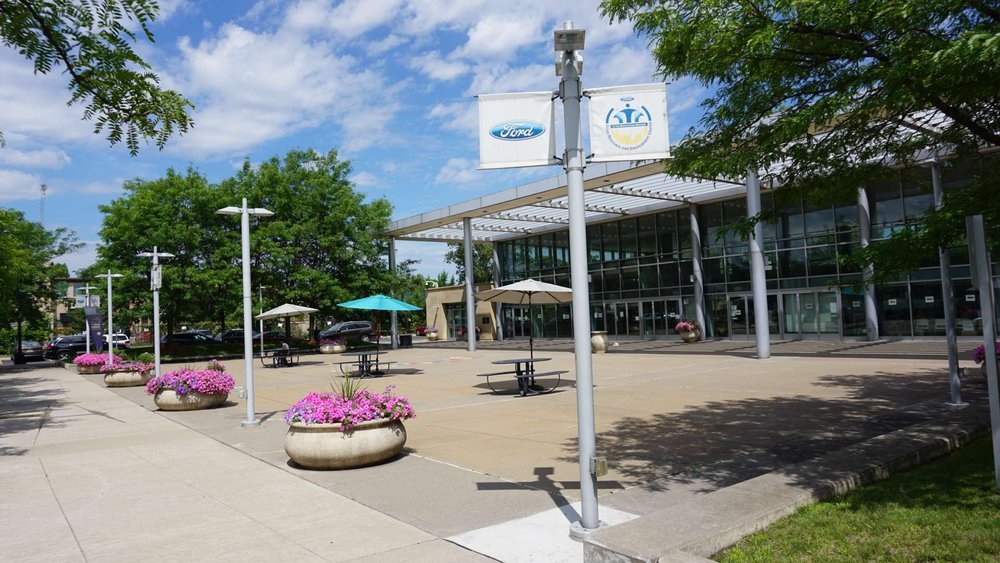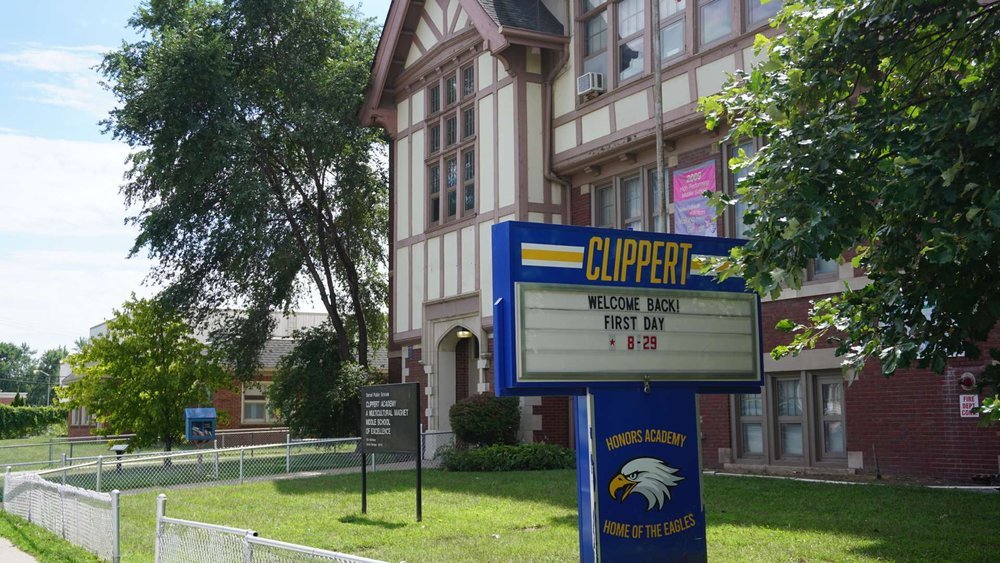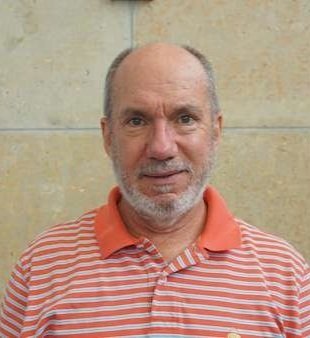What is Southwest Detroit Doing to Combat Inaccessibility to Legal Services?
Out of the many factors that can make life difficult for immigrant communities, inaccessibility to quality, trustworthy legal services is certainly among the greatest. But one clinic in Southwest Detroit is working to change that.
Story and Photography by Josue Mata
Every day, clients crowd the Southwest Detroit Immigrant and Refugee Center lobby. Foreign languages resonate throughout the building as they wait, filling out intake forms. Children swarm around them restlessly, asking questions and play-fighting among themselves. Their older siblings are in school, learning a new language and assimilating into a foreign culture. Inside the office, keyboards clack, people talk and printers whir. Immigrants tell their stories through translators, justifying why they should be allowed to live and work in the United States.
2826 Bagley St., the location from which SWIRC operates on Wednesdays from noon to 6 p.m.
In September, Mexican immigrant Daniel Solorzano, who was given a pseudonym for this story to protect his privacy, will find himself waiting in this lobby to receive long overdue legal advice. Although he made his appointment in August, the clinic, known as SWIRC, is so busy that appointments are backlogged by an entire month.
Daniel’s troubles, like those of many Hispanic immigrants, began in childhood. His parents brought him to the U.S. illegally in 1995, at age 11. “Mom and Dad brought me,” he says, “so I didn't know why we (came), I just knew that we were going to be all together. The whole family.”
His direct clash with the American legal system, however, began his junior year of high school when he sought to pursue his interests in the medical field. Without papers and tens of thousands of dollars on hand, he was unable to attend college and had to abandon his dream, settling for work in construction.
Later on, he would marry a U.S. citizen. This position would afford Daniel the ability to file for citizenship, but he didn’t know that at the time, and would long since be divorced before he ever realized the missed opportunity. Before the rise of social media, most undocumented immigrants knew little of the way the legal system worked because they rarely consulted practicing lawyers. They lived in constant fear that anyone could rat them out to the government, and so consulting anyone on how to file for legal status was simply not a choice for most.
The lack of accessibility to legal resources for many immigrants is tragic and often produces a butterfly effect throughout their lives. “If I would've had all (the knowledge I do now), I would've probably already submitted everything that I needed for me to have a legal status,” Daniel says, adding, “even though I was already out of school, I could have gone back and done what I really wanted to do, which was in the medical field. I think it would have been a better life than just in construction.”
Tragedy struck when Daniel’s family was permanently separated. In 2010, his parents were deported from the U.S. and barred from reentry for 10 years. Lacking legal status, Daniel could not risk leaving the U.S. to visit them.
Clippert Multicultural Magnet Honors Academy in Southwest Detroit, a middle school with a 93% Hispanic student body.
In 2020, they began the process of filing for legal reentry. The fruits of their labor, however, would be discarded when they died from COVID-19 in the latter part of 2021, before their papers could be processed.
The lack of legal status and trustworthy, accessible legal services is not unique to Daniel. Countless families dealing with a lack of legal status live in fear of being split up every day, and perhaps the most tragic impact is felt by children. “Students are more highly strung depending on their immigration status and the status of their parents,” says Leslee Przygodski, an eighth grade teacher at Clippert Academy in Southwest Detroit. “I think it can make it harder to concentrate … In my opinion, immigration is trauma-causing.”
Przygodski says children often live in fear as a result of their parents’ legal statuses. This can make it difficult to participate in school and form connections with other children that, oftentimes, will not understand their struggles. “Students feel like they have something to hide or that they can't really be their true self with everybody because there's that fear of, you know, can somebody say something? Is this friend going to tell me?” she explains.
Furthermore, as the economy suffers, prices for bare necessities go up, and immigrants find themselves having an even harder time finding quality legal services within their means. Racist ideologies have run rampant throughout the country in recent years, and so the U.S. has become increasingly unwelcoming.
“We are here. We're trying to do our best. We're trying to have a life, but the way everything is, it is getting harder and harder for everybody. Not only us, but for everyone,” Daniel says.
This mural, “Hijo de Maiz,” by artist Dasic Fernandez can be found in Southwest Detroit on West Vernor and Cavalry. Fernandez, a Chilean artist, has gone on to paint murals for the Super Bowl.
The future of the Southwest Detroit community is not lacking in hope, however. SWIRC is a preview of the bright future our community is working to build. Founder and executive director Kevin Piecuch says SWIRC provides “legal service and advice to those who are most vulnerable and can least afford it, which we believe are immigrants, refugees and people from disadvantaged communities.”
By maintaining a nonprofit model, and running off mostly volunteer work, SWIRC has been able to provide Southwest Detroit with accessible, quality legal services for nearly a decade. These legal resources are often administered by volunteers, paralegals and even lawyers that come from Southwest Detroit and understand the immigrant struggle.
It’s not uncommon for members of the community to go through law school, eager to give back to their community and contribute to a brighter future. “I've had some former students who have become very successful immigration lawyers,” Pryzgodski says. “And I know they're doing it from a place of, ‘I want to help the community and I have a passion for this. And I see these people who are underserved and who I know I can help.”
Kevin Piecuch, founder and executive director of the Southwest Detroit Immigrant and Refugee Center.
Although countless immigrants and refugees continue to live with an inaccessibility to legal services and a constant fear of deportation, the community is working hard to make life easier for everyone in the face of heavy adversity.
While SWIRC sees as many as 18 clients on a slow day, the legal needs of the community are still not fully met. “We're barely scratching the surface. There's room for 10 SWIRCs in Detroit,” Piecuch says. Regardless, improvements in accessibility are being made. Ten years ago, SWIRC had not yet been founded and legal services were that much less accessible. In another 10 years, the legal landscape of the United States as a whole could become far more accessible to immigrants if nonprofit organizations like SWIRC continue to be launched and funded.
“The worst possible outcome is to feel powerless in the face of injustice. If we truly want to make a better world, then take one step, take two. If we're all willing to commit even a little bit of time and effort to solving any one of our problems, I think we can solve all of our problems quickly,” Piecuch says.
With a newfound vitality and determination to contribute to a brighter future, the immigrants and allies of Southwest Detroit have found the courage to hope for better things, and rise from the ashes.
Interested in receiving help from SWIRC? Visit any of the following offices:
99 Wayne St., Pontiac (open Tuesdays 12-5 p.m.)
2826 Bagley St., Detroit (open Wednesdays 12-6 p.m.)
15491 Maddelein St., Detroit (open Thursdays 12-5 p.m.)
In-person appointments can be booked online at detimmigrantcenter.com/legal-services/make-an-appointment.





